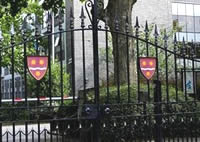London Oratory School Defends Admissions Policy in High Court
Fulham's London Oratory School has appeared at the High Court this week to defend its admissions policy.
Last year the Office the Schools Adjudicator backed a complaint by the British Humanist Association to rule that the Oratory School breached the Admissions Code.
The Seagrave Road Roman Catholic school's policy uses a grid system to score potential pupils against eight mainly religious criteria, including whether parents spend at least three years on church duties, for example singing in the choir, arranging flowers or voluntary work.
In August 2014, following an objection by the British Humanist Association, the OSA ruled that elements of the policy broke a section of the official admissions code intended to stop parents obtaining places by giving practical or financial support to schools or associated bodies such as churches.
The adjudicator said the school’s "service" criterion requiring three years' service by an applicant or their family "will favour those parents who are good at planning ahead and who are sufficiently well organised to identify the admission criteria, who ensure that they undertake the necessary activities and who keep sufficient records to be able to evidence that they have done this."
However, this week at the High Court, the school claimed that the adjudicator, Dr Bryan Slater, far exceeded the concerns of the original complaint to make a “sustained ‘root and branch’” attack upon its admissions criteria for 2014 and 2015.
London Oratory, which is seriously oversubscribed and is consistently one of the best performing schools in the borough, said that faith-related criteria such as asking to see parents’ baptismal certificates helped it to preserve its Catholic ethos.
It accused Dr Slater of making "basic errors of reasoning" to determine that those admissions criteria discriminated against minority and less-well off children and said that in many places he fundamentally misunderstood the school's criteria.
Charles Béar QC, who is representing the school, told Mr Justice Cobb: " The school view is that altering the
faith-based criteria will alter the composition of the intake and damage the school ethos."
In addition, the school argued that faith-based oversubscription criteria actually made the school more diverse, because it resulted in students being recruited from a wider geographical spread.
It acknowledged that the school’s ethnic diversity was lower than that of neighbouring Catholic schools but argued this was because of its particular religious tradition, its reputation for Latin teaching and traditional Church music.
London Oratory has changed its 2015 admissions policy to reflect the OSA’s judgement, but now seeks clarification on whether these revised arrangements for 2016 are lawful.
Ahead of the hearing, British Humanist Association Campaigns Manager Richy Thompson said:" The degree to which the London Oratory’s admissions criteria have both ethnically and socio-economically skewed its intake is appalling, and the Schools Adjudicator was right to find against it.
"It is amongst the ten most socio-economically selective state secondary schools in the country, taking just 6% of pupils eligible for school meals compared to 36% locally. We hope the High Court will uphold the adjudicator’s decision."
The hearing continues.
March 27, 2015
